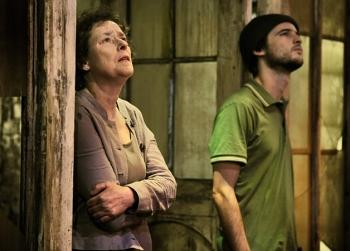Wastwater
Wastwater is, apparently, the deepest lake in England and resides in the Lake District National Park. The lake is mentioned in this play with the same name by Simon Stephens, but apart from depth and ugly things which might lurk at the bottom of this great expanse of water, I'm struggling to find any stronger connection.
'Wastwater' is actually set, not in the Lake District as the name might imply, but in three locations near to Heathrow airport. The play is divided into three distinct sections and stories which are tenuously linked to each other.
The first act or scene is set in a dilapidated greenhouse. Frieda is a foster mother saying goodbye to Harry, one of her foster children, who seems to be heading off to the West Coast of Canada to count killer whales. There's obvious tension here between the two as they struggle to find words in their last moments together.
In the second scene a policewoman, Lisa, and an art teacher, Mark, are together in an airport hotel bedroom. Both are married (but not to each other) and it's obvious they are having an affair. After a while, Lisa asks Mark to hit her, suggesting that she is interested in sado-masochistic sex. At first Mark is shocked and hesitant, but eventually slaps Lisa across the face several times.
The final scene takes place in a seedy underground car park. Sian appears to be a kind of child trafficker who has arranged to sell a child to Jonathan, a middle-class professional who works in Islington. As they conduct the transaction, Sian humiliates her customer at every opportunity, producing a suffocatingly uncomfortable scene.
Katie Mitchell's meticulous direction ensures that there's nothing to complain about in terms of the production values, and much to admire. There's excellent use of sound throughout with near-deafening planes punctuating the proceedings and providing pauses. The cast all produce memorable and compelling performances - especially Amanda Hale as the oppressively domineering Sian who delights in belittling and terrifying her male customer. But perhaps the most striking thing about this production is the ingenuity of the set build and the scene changes. Though we have to wait while the scenes are changed, it's all done in double-quick time, and when the curtain flies up again, we're transported to vastly different and detailed locations which appear to bear no relation to each other.
Simon Stephens's script romps up the tension progressively to an almost unbearable climax in the final scene. It's not without humour, but that's incidental rather than being a central feature. But I'm still not certain that Mr Stephens makes it clear what the play is about. I lost count of the number of times that characters use the word 'bewildering', or a derivative of it, during the play. And that makes me wonder whether that isn't a clue. The play is certainly about children - troubled children who have been taken in by adults who are not their parents. But the play is also about motivation and what lurks in the depths of an individual's psyche. And then there's the significance of the airport which lurks in the background of all the scenes, suggesting the ability to get away from something, or to be transported to something. Maybe the real point of the play is that there is no 'right way' to think about it at all - the experience alone being enough. If that's the case, it's a valid approach, but nevertheless leaves one feeling a little cheated, and in my case at least, bewildered.
"A strenuously elusive piece that suggests our world has become grossly dehumanised but fails to makes us care."
Henry Hitchings for The Evening Standard
"The writing is so elliptical, the characters' motives and feelings so obscure, that one never becomes fully involved...manipulative, cruel and cold-hearted play."
Charles Spencer for The Daily Telegraph
"Stephens's triptych offers isolated existential choices. Like the fat boy in Dickens, Stephens wants to make our flesh creep; but, in the end, that isn't quite enough.."
Michael Billington for The Guardian
Originally published on
